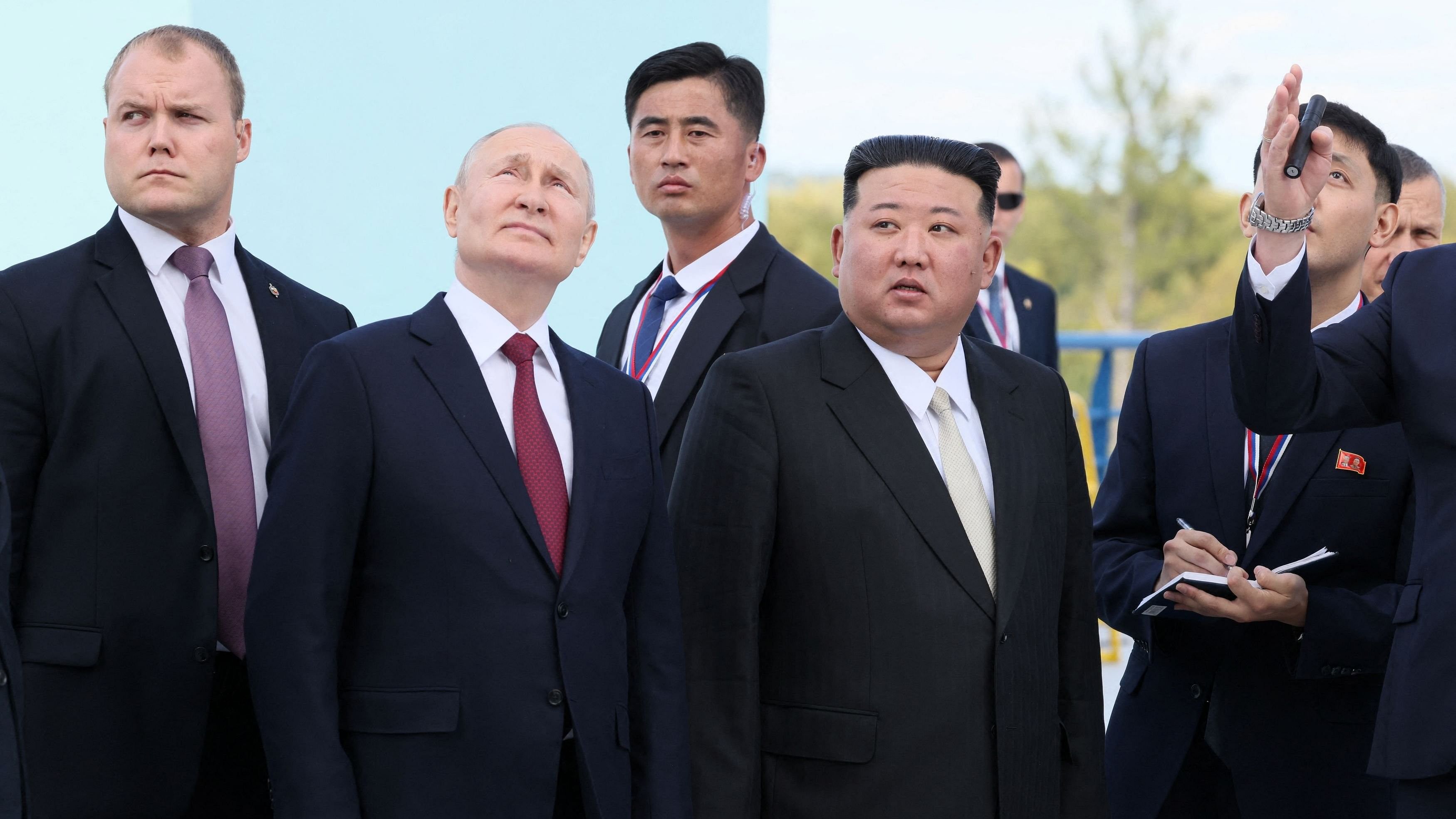
Russia's President Vladimir Putin and North Korea's leader Kim Jong Un.
Credit: Reuters Photo
Seoul: Russian President Vladimir Putin may visit Pyongyang for meetings with North Korean leader Kim Jong Un as soon as next week, South Korean officials say. Here's how North Korea-Russia relations began, and how the two countries' ties have warmed in recent years.
What is the history behind their ties?
As Russia's isolation from the West over its war in Ukraine has grown, analysts say it has seen increasing value in North Korea. For North Korea's part, relations with Russia haven't always been as warm as they were during at the height of the Soviet Union, but now the country is reaping clear benefits from Moscow's need for friends.
Communist North Korea was formed in the early days of the Cold War with the backing of the Soviet Union. North Korea later battled the South and its US and United Nations allies to a stalemate in the 1950-1953 Korean War with extensive aid from China and the Soviet Union.
North Korea was heavily reliant on Soviet aid for decades, and the collapse of the Soviet Union in the 1990s contributed to a famine in the North.
Pyongyang's leaders have often tried to use Beijing and Moscow to balance each other. Kim, who came to power in 2011, initially had a relatively cool relationship with Russia and China, which both joined the United States in imposing strict sanctions on North Korea over its nuclear tests.
Russia has since joined China in opposing new sanctions on North Korea, blocking a US-led push and publicly splitting the UN Security Council on the issue for the first time since it started punishing Pyongyang in 2006.
In March, Russia blocked the annual renewal of a panel of experts monitoring enforcement of longstanding UN sanctions against North Korea over its nuclear weapons and ballistic missile programmes.
How are Russia and North Korea interacting?
After his country's most recent nuclear test in 2017, Kim took steps to repair ties and he met Putin in 2019 for the first time in the Russian city of Vladivostok.
In September last year, Putin welcomed Kim to the Vostochny space launch facility in Russia's far east and promised to help North Korea build satellites, among other vows of cooperation and support.
Underlining the deepening ties, then Russian Defence Minister Sergei Shoigu visited Pyongyang in July 2023 and toured a weapons exhibit that included the North's banned ballistic missiles. He later stood beside Kim and saluted those missiles as they rolled by during a military parade.
Since Kim and Putin met last year there has been a steady stream of delegations between the two countries on everything from forestry and agriculture to zoos and culture.
How has the Ukraine war affected the relationship?
North Korea has reciprocated with public support for Moscow after Russia's full-scale invasion of Ukraine in February 2022. It was one of the only countries to recognise the independence of Russian-claimed Ukrainian regions, and it expressed support for Russia's annexation of parts of Ukraine.
The U.S. and others have accused North Korea of transferring weapons to Russia for use against Ukraine.
The debris from a missile that landed in the Ukrainian city of Kharkiv on Jan. 2 was from a North Korean Hwasong-11 series ballistic missile launched from Russian territory, UN sanctions monitors told a Security Council committee in a report seen by Reuters.
Both Moscow and Pyongyang have denied the accusations, but vowed last year to deepen military relations.
Shoigu told Russian media last year that Moscow was discussing holding joint military exercises with North Korea.
"Why not, these are our neighbours. There's an old Russian saying: you don't choose your neighbours and it's better to live with your neighbours in peace and harmony," Interfax news agency quoted him as saying.
What are the economic ties?
In 2022 Russia and North Korea restarted train travel for the first time since railway journeys were cut during the Covid pandemic. The train carried an unusually opulent cargo: 30 thoroughbred horses.
Shortly after that, Russia resumed oil exports to North Korea, UN data shows, the first such shipments reported since 2020.
The vast majority of North Korea's trade goes through China, but Russia is a potentially important partner as well, particularly for oil, experts said. Moscow has denied breaking UN sanctions on oil exports to Pyongyang, but Russian tankers have been accused of helping evade caps on exporting oil to North Korea.
Russian officials have openly discussed "working on political arrangements" to employ 20,000 to 50,000 North Korean labourers, despite UN Security Council resolutions that ban such arrangements.
Russian officials and leaders in occupied regions of Ukraine have also discussed the possibility of having North Korean workers help rebuild war-torn areas.